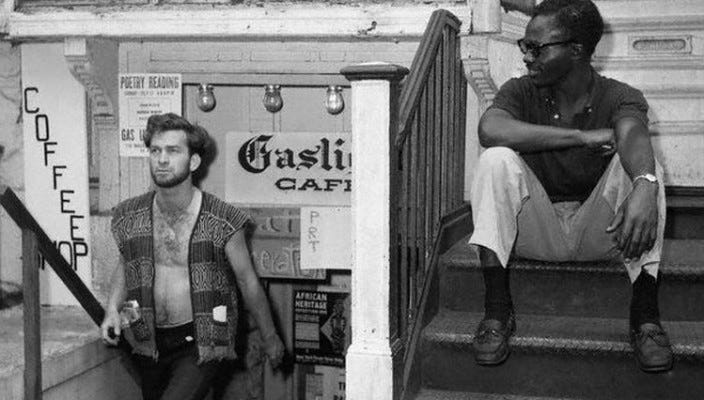
So there they were again—ghosts of Neal and Allen and Jack—beat-eyed and barefoot in the halls of a digital inferno, walking soft along the edge of a Wi-Fi signal, and they were whispering from the stars: “Everything real is hidden in the margins, kid.”
We’re living in a time strangled by too much. Too much news, too much noise, too much product and passwords and piety without mystery.
Post-war America was the garden of plenty—Coca-Cola dreams, vacuum-cleaner wives, and Tupperware theology. And the Beats, God bless ‘em, they didn’t buy it. They rolled past the suburbs like saints on stolen motorbikes, seeking the sacred in jazz notes, the Word in every wandering, and salvation in the belly of experience itself.
Their rebellion was holy in its messiness, poetic in its refusal to kneel to the dollar or the preacher or the gray flannel man.
And now here we are again, only the suits have changed. The gray flannel has turned to polyester athleisure and Silicon Valley hoodies, but the gospel’s the same: buy more, do more, scroll faster, upgrade endlessly. You are not enough unless you have more. This isn’t life—it’s a dopamine slot machine in your pocket, and the odds are rigged.
But I hear the murmur of a new movement, quieter than protest songs but deeper than slogans. The mindfulness minimalists, the Gen Z dropouts, the voluntary simplicity pilgrims, and those strange and wonderful creatures who are building time co-ops, not just for economic reasons but for belonging. It’s the same holy fire that burned under Kerouac’s fingers—this yearning to be free, to be real, to step out of the consumer carnival and into the moment that breathes.
They reject the myth of productivity as identity. They don’t want a career, they want a life. They don’t dream of beachfront property but of peace, of enough. They are suspicious of the algorithmic gods that watch them sleep. They leave jobs that pay well but starve the soul. They trade fast fashion for one good pair of boots. They walk slower. They talk softer. And they’re asking the same question that Ginsberg howled into the American night: “What’s actually sacred?”
Time co-ops, these unsung temples of human value, might just be the most radical idea yet. Because in this system, you don’t trade your time for money—you trade it for other people’s time. It’s economy without exploitation, math without greed. When you fix someone’s sink or teach their kid guitar, you earn credit not for profit, but for participation. That’s mutualism. That’s the drumbeat of a tribe waking up from the capitalist trance. It’s community currency that can’t be hoarded, can’t be invested in hedge funds, can’t be traded on Wall Street—only lived.
This is not utopia. It’s not some sun-drenched commune with hand-holding and matching robes. It’s not easy. But it’s honest. It says: your time is valuable because you are. Not because you’re productive. Not because you went to Stanford. Not because you’re a brand. Because you exist. You breathe. You care. That’s the new wealth. And it doesn’t inflate or crash—it connects.
In their own strange way, the Beats were proto-minimalists. They didn’t want the latest toaster. They wanted to see God on a freight train. They didn’t measure worth in net income, but in depth of feeling. And maybe the new rebels aren’t hitchhiking to Big Sur, but they’re logging off Instagram, deleting the apps, growing tomatoes in busted-up city yards, and daring to ask: what if we built an economy out of love instead of fear?
It sounds wild. But so did jazz once. So did Buddhism in 1957. So did Kerouac.
What if time was the real currency all along? What if the great treasure isn’t a house or a stock portfolio or a resume with gold stars, but a shared moment, a helping hand, a truth spoken without performance? What if we stopped producing ourselves like products and started creating ourselves like poems?
This is the modern Dharma. This is the next sacred nowhere, found not in the desert but in the overlooked neighborhood, in the shared meal, in the radical act of being present when you could be distracted. And this isn’t just rebellion—it’s salvation. Because capitalism, in its current form, is burning the soul out of the world. And maybe the only thing that can save us now is to drop out and drop in to something ancient and waiting—connection, simplicity, time well spent.
The new Beatnik doesn’t need a beret. They need courage. They need vision. They need a willingness to be weird, kind, unprofitable, awake. And they don’t travel alone. They form communities, not corporations. They make co-ops, not competitors. They start where they are, give what they can, and they believe that if enough of us live differently, the system will collapse under its own absurdity and give way to a better rhythm—a human one.
So this is your invitation. Step off the grid. Unplug from the lie. Share your time. Live slow. Create art. Breathe deep. And maybe—just maybe—hear the distant echo of a bongo drum in your chest, calling you back to what really matters.
Amen. Or as Kerouac might say: “Yes, yes, yes.”